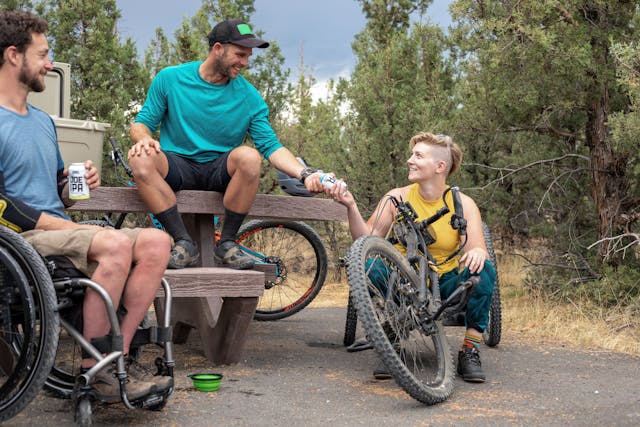Certificate III in Individual Support
Gain the skills and experience you need to begin a fulfilling career as a disability or aged care support worker.

Compare courses from Australia's top training organisations










Start your career as a disability or aged care support worker with the Certificate III in Individual Support.
Would you like to make a difference in people’s lives by providing essential care and support? The Certificate III in Individual Support is the ideal starting point for a rewarding career in aged care, disability support, or home and community care.
Your studies will help you develop essential skills such as: 
- Supporting the independence and wellbeing of clients
- Providing personal care and assistance with daily tasks
- Communicating and collaborating with clients, families, and healthcare professionals
- Following safe work practices and maintaining a safe environment
- Understanding and respecting individual needs, preferences, and rights
On completion, you'll be qualified for roles such as aged care worker, disability support worker, personal care assistant, home care worker, and community care worker. With Australia’s ageing population and growing demand for in-home and residential care, there is a strong need for skilled care workers across aged care facilities, disability support services, and community organisations.
With the current and projected skills shortage in the care sector, this qualification will set you on the path to a fulfilling and secure career.
To earn this qualification, you must complete at least 120 hours of practical work placement in a regulated care service. This hands-on experience is essential to apply what you learn in a real-world setting.
The CHC33021 Certificate III in Individual Support is a Nationally Recognised course.
Did you know?
From 1 January 2025, Certificate III qualified aged care support workers will receive a 3% wage increase. A second increase will happen on 1 October 2025.
Fast facts about the Certificate III in Individual Support
Study online
Flexible schedule
Start anytime
Finish fast
Find your course today
Enrola can recommend the best Certificate III in Individual Support course for you. Take our 2 minute quiz to get your recommendation.
Careers in Individual Support
Here are just a few examples of the types of roles you’ll be qualified for once you complete your course.
.jpg?width=640&height=427&name=pexels-cliff-booth-4058217%20(1).jpg)
Disability Support Worker
A Disability Support Worker provides personalised care and practical assistance to individuals with disabilities, either in their homes or community environments. In this role, you’ll help clients with daily tasks such as personal hygiene, meal preparation, and mobility. You’ll also offer support with social and recreational activities, encouraging clients to develop new skills and participate in community life. Your goal is to promote independence, inclusion, and confidence.

Aged Care Support Worker
An Aged Care Support Worker assists older adults living in their homes or community settings, helping them maintain their independence and quality of life. Your role will include supporting clients with household tasks, personal care, medication reminders, and transportation to appointments or social activities. By building trusting relationships, you’ll help clients stay connected to their communities, fostering social engagement and overall wellbeing.

Personal Care Assistant
A Personal Care Assistant (PCA) provides essential care and daily living support to older adults, often within residential aged care facilities. In this role, you’ll help clients with tasks such as bathing, dressing, and mobility, while promoting their independence and wellbeing. You’ll also assist with meals, social engagement, and emotional support, ensuring a safe and compassionate environment. Depending on the setting, you may work independently or as part of a healthcare team.

Community Support Worker
A Community Support Worker helps individuals with disabilities build their independence and connect with their communities. Your responsibilities include assisting clients with social outings, educational activities, and employment opportunities. By fostering social skills and boosting confidence, you’ll help clients achieve their personal goals and participate more fully in everyday life. This role is often based in community centres, group homes, or clients’ own homes, with a focus on empowerment and inclusion.
Did you know?
Australia is currently facing a shortage of qualified support professionals. A 2024 Jobs and Skills Australia report predicts annual employment growth of 31,400 positions.
Read what our customers say
Enrola helps students like you find, compare and enrol in top courses in Australia.
Course Structure
The CHC33021 Certificate III in Individual Support consists of:
-
15 course units
-
Minimum 120 hours of work placement
Work Placement

The Certificate III in Individual Support requires a minimum 120 hours of work placement.
A work placement is where you will attend an approved aged or disability support service provider to complete on-the-job training and assessments.
Exactly how work placements are arranged varies slightly between each registered training organisations (RTO). Some RTOs are willing and able to find and arrange the placement for you. Others require you to be more pro-active in arranging the placement but will provide you with full support and guidance. Whilst this might feel a little daunting, it is great preparation for starting your career and can lead to multiple offers from which you can choose!
When you do the work placement also varies between RTOs. Usually, you will complete at least a few core course units before beginning a work placement. Then you may begin the work placement a day or two per week, alongside study. Or it may be arranged as a full-time block of work of 3-5 weeks towards to end of your study.
Get detailed information about how and when each RTO arranges work placements with your your course recommendation.
Course Units
The Certificate III in Individual Support requires you to complete 15 course units. This consists of 9 core units and 6 elective units.
If you choose an online course, the course units are completed with online study and assessments.
9 Core Units
| CHCCCS031 Provide individualised support |
| CHCCCS038 Facilitate the empowerment of people receiving support |
| CHCCCS040 Support independence and wellbeing |
| CHCCCS041 Recognise healthy body systems |
| CHCCOM005 Communicate and work in health or community services |
| CHCDIV001 Work with diverse people |
| CHCLEG001 Work legally and ethically |
| HLTINF006 Apply basic principles and practices of infection prevention and control |
| HLTWHS002 Follow safe work practices for direct client care |
Elective Units and Specialisations
It is possible to complete the Certificate III in Individual Support qualification with a specialisation. It is common for training organisations to offer a combined Ageing and Disability specialisation. If you are completing a specialisation, you must complete all three units from your chosen specialisation. If you are not completing a specialisation, you must complete at least three units from either specialisation. You must complete six elective units in total.
Ageing Specialisation Units
| CHCAGE011 Provide support to people living with dementia |
| CHCAGE013 Work effectively in aged care |
| CHCPAL003 Deliver care services using a palliative approach |
Disability Specialisation Units
| CHCDIS011 Contribute to ongoing skills development using a strengths-based approach |
| CHCDIS012 Support community participation and social inclusion |
| CHCDIS020 Work effectively in disability support |
Other Elective Units
| CHCAGE007 Recognise and report risk of falls |
| CHCAGE012 Provide food services |
| CHCAOD001 Work in an alcohol and other drugs context |
| CHCCCS001 Address the needs of people with chronic disease |
| CHCCCS017 Provide loss and grief support |
| CHCCCS033 Identify and report abuse |
| CHCCCS034 Facilitate independent travel |
| CHCCCS035 Support people with autism spectrum disorder |
| CHCCCS036 Support relationships with carer and family |
| CHCCCS037 Visit client residence |
| CHCCCS042 Prepare meals |
| CHCCCS043 Support positive mealtime experiences |
| CHCCCS044 Follow established person-centred behaviour supports |
| CHCDIS011 Contribute to ongoing skills development using a strengths-based approach |
| CHCDIS013 Assist with communication using augmentative and alternative communication methods |
| CHCDIV002 Promote Aboriginal and/or Torres Strait Islander cultural safety |
| CHCGRP001 Support group activities |
| CHCMHS001 Work with people with mental health issues |
| HLTAID011 Provide First Aid |
| HLTHPS006 Assist clients with medication |
| HLTOHC007 Recognise and respond to oral health issues |
Did you know?
There are over 600 registered training organisations in Australia with whom you can study this qualification. Enrola can recommend the best option for you!
Frequently Asked Questions
Fast answers to the most common questions.
Education
There are no formal education pre-requisites required. The qualification is intended for entry-level participants. You may be required to undertake a basic language, literacy and numeracy (LLN) test during the pre-enrolment process.
Minimum Age
If you are under the age of 18 years, you are required to provide signed consent of a parent or guardian to enrol in this qualification.
Residency Status
You will need to be an Australian citizen, permanent resident or equivalent*. Unfortunately, we are not able to enrol students with a Student or Working Holiday Maker visa.
* Certain classes of visa holders are eligible to enrol. We will check your visa when you take the course advisor quiz.
Police Check
For the work placement component, you may need a police clearance and possibly other checks.
Course fees will depend on the Registered Training Organisation (RTO) you choose for your course.
Payment plans are a popular way to make course fees affordable and many of Enrola's favourite RTOs offer these.
Discounts are available if you can pay your course fees upfront.
You'll be able to compare course fees and payment plans when you get your course recommendations with Enrola.
Maybe you've heard of "Free TAFE" or other government funding programs that subsidise student course fees?
Some Registered Training Organisations (RTOs) do have government funded places available. This means the course fees will be free or significantly cheaper for eligible students.
When making a course recommendation, Enrola checks the availability of government funded places and your eligibility for a place. Eligibility and availability is dependent on your location in Australia. If a place is available and your eligible, we'll definitely let you know! Why not get your recommendation now?
However, we like to make students aware that it can sometimes be difficult to find a government funded place that meets all their preferences. For example, in Western Australia it is not possible to study online with a government funded place.
If you really want to do an online, self-paced course - because, for example, you work full-time - then you might need to consider a paid course with a good payment plan. You can compare options by taking Enrola's course advisor quiz to get your personalised course recommendations.
Yes.
The Certificate III in Individual Support requires a minimum 120 hours of work placement.
A work placement is where you will attend an approved aged or disability support service provider to complete on-the-job training and assessments.
Exactly how work placements are arranged varies slightly between each registered training organisations (RTO). Some RTOs are willing and able to find and arrange the placement for you. Others require you to be more pro-active in arranging the placement but will provide you with full support and guidance. Whilst this might feel a little daunting, it is great preparation for starting your career and can lead to multiple offers from which you can choose!
Work placements are typically unpaid, but very often lead to a job offer on completion.
When you do the work placement also varies between RTOs. Usually, you will complete at least a few core course units before beginning a work placement. Then you may begin the work placement a day or two per week, alongside study. Or it may be arranged as a full-time block of work of 4-6 weeks towards to end of your study.
Get detailed information about how and when each RTO arranges work placements with your your course recommendation.
The Certificate III in Individual Support qualifies you to work in either aged care or disability. But it's possible to do a specialisation in Ageing, Disability or both.
Many registered training organisations (RTOs) only offer their course with a dual Ageing and Disability specialisation. You will study 9 core course units, then 3 units focused on ageing and 3 units focused on disability. This gives you a great grounding in both sectors and maximises your employment and further study options.
Some training organisations allow you to choose to a single specialisation: ageing or disability. In this case, you'd do the 3 specialised course units and then you can choose 3 other course units related to your course.
It depends on the course.
It's possible to find courses which specialise ONLY in disability or ONLY in aged care. But many courses will require you to do a dual specialisation.
If you feel strongly about only studying one specialisation, it's certainly possible.
The exact assessment process will depend on your registered training organisation (RTO). But we typically see each RTO has assessments that encompass a variety of quizzes, knowledge questions, and case studies.
Video
Students can be given practical tasks and scenarios to perform and record in the workplace.
Knowledge questions
Students respond to short-answer questions based on the content covered in the unit.
Project
Students undertake a project related to what they have studied in the unit, allowing them to explore a specific topic or field in greater depth.
Case study
Students can be presented with a scenario and asked to adapt their responses as the situation evolves. The assessor will examine how effectively students manage various circumstances and apply their knowledge.
Quiz
Quizzes may include multiple-choice, matching, and true/false questions. They are intended to assess students’ understanding of a particular subject.
Assignment
Students will be given an assignment drawing on their unit content. The tasks are designed to reflect real-life industry situations and scenarios.
Practical
The practical component is designed to assess the student in a real/simulated environment and may contain logbooks or observation checklists.
Yes. The Certificate III in Individual Support (CHC33021) is Nationally Recognised Training.
Yes! There are a number of registered training organisations (RTOs) offering online courses.
If you take our 2 minute quiz, we can recommend the best option for you.
Yes!
There are a number of registered training organisations (RTOs) offering part-time or self-paced schedules, usually with online learning. Their courses are designed for people like you.
They can also help you to plan your work placement around your current job.
There is a Certificate IV in Ageing Support and a Certificate IV in Disability Support.
The Certificate IV in Disability Support requires you to complete the Certificate III, with the disability specialisation, first. It is an entry requirement for the Certificate IV.
The Certificate IV in Ageing Support does not formally require the Certificate III for entry, but it is recommended.
Many students choose to study the Certificate IV part-time, once they are working in the sector. The Certificate IV qualifies you for leadership roles in the sector.
So glad you asked!
Enrola is a comparison marketplace for Australian vocational education courses, designed to help students find, compare, and enrol in the best courses with confidence.
Enrola eliminates the hassle by offering expert course advice, transparent comparisons of fees and student reviews, and a fast, easy enrolment process. Our platform ensures you’re equipped with all the information you need to make a confident decision, without the pressure or confusion.
To get started, take our 2 minute course advisor quiz and get your course recommendations.
That feeling when you finally find the right course.
Join 3000+ happy students who have used Enrola to find their course.

Interview With The Expert
We speak to Jo Thomas, CEO and course advisor at Enrola, to get the inside scoop on the Certificate III in Individual Support.
Hi Jo! So, what sort of people do you see enrolling in this course?
Hi everyone! Oh, we see a big range of people.
We've quite often seen people who are driven by an event that has happened in their personal lives, such as a friend or family member requiring care. This might bring them awareness of the career as an option or they can be motivated by the personal connection to someone who needs professional care.
Otherwise, we're often seeing people who are looking for a career change. This can really vary from people who want something more than packing boxes in a factory to those fleeing corporate office life!
Although we do see recent school leavers too - young men and women who maybe haven't decided what they want to do with their lives yet, but they'd love a job with meaning and positive impact to do in the mean time.
How easy is it to get a job in the sector? How do people get their first job?
Australia is experiencing a skills shortage in the sector, so there's A LOT of demand for qualified workers. And the Certificate III in Individual Support is the qualification you need to be in demand.
We see most students get their first job through their work placement. The Certificate III in Individual Support requires you to complete a 120 hour work placement as part of your training. The employers that take students for the work placement usually have the intention to hire them full-time once they complete their qualification.
When you enrol in a course, your registered training organisation (RTO) will work with you to find a work placement.
Is it better to work or study in disability than aged care?
Oh, I wouldn't say either is "better". The Certificate III in Individual Support qualifies you to work in either sector.
It's possible to do a specialisation in disability or aged care, if you want to and your chosen registered training organisation (RTO) supports it. Most RTOs offer the course with both specialisations, which means that you do the normal 9 core course units, then you do 3 units focused on aged care and 3 units focused on disability.
I think we have a couple of RTOs that only have a specialisation in one or the other. This is usually because they have a close relationship to employers in one sector or the other and are focused on getting their students into work with - for example - aged care providers that they partner closely with.
For people who have never worked in the sector, I generally encourage them to keep an open mind and stay flexible. It's usually not until you start working that you figure out what you really enjoy and don't. The great thing about this sector is that are a lot of different ways of working. You know, some people find they prefer to go to the same workplace everyday and see the same colleagues. For them, working in an aged care home is great. Others love visiting clients in their homes and going somewhere different every day.
Students can get their first taste of working in the sector with the 120 hour work placement.
“Australia is experiencing a skills shortage in the sector, so there's A LOT of demand for qualified workers.”

Jo Thomas
CEO and Course Advisor
Can you tell us more about the work placement?
Sure! So, like I said, students are required to complete a minimum 120 hour work placement as part of their training.
Your registered training organisation (RTO) will work with you to find a work placement. Sometimes they have good relationships with employers in the sector and they will basically just find and arrange a placement with an employer near where you live. Other RTOs like the student to try and find their own placement, but they'll offer a lot of support to help the student do that. Some students prefer to have everything arranged for them, which I understand. But it's important to know that it's not hard to find a work placement in this sector (if you follow the advice and take the support of your RTO). And if you organise your own work placement, you can get better insight into the employers you might like to work for.
What types of employers offer work placements?
Aged care homes are very common for those studying the ageing specialisation.
Disability service providers are common if you are studying the disability specialisation.
RTOs will typically have relationships with employers in both sectors and can help you find a placement.
Is the work placement paid?
The short answer is "no". Work placements are not supposed to be or required to be paid. You are completing training in a practical environment, not doing a paid job.
The longer answer is "maybe". We've seen student who are already working in the sector and complete their work placement as part of their paid job. If you are already working in the sector, it's best to study with an RTO that is supportive. Some are a bit more set up and catering towards those already working in the sector.
How much do support workers get paid?
Great question.
So, according to Jobs and Skills Australia, the average full-time weekly earnings of those working in the sector is $1,564. That's based on a 2023 survey.
If we get more specific, the minimum hourly rate for a full-time employee working as an aged carer - who has the Certificate III qualification - is $32.14. That's the 2025 minimum award rate for a newly qualified employee.
But people who need support don't just need it 9am to 5pm, Monday to Friday. If you work in support, there are opportunities to work weekends, night shifts and overnight stays. The minimum hourly rate for a Sunday is $56.25.
The award wages for disability support work are a bit more complex, as it depends on the exact type of work you are doing and in which state. But the minimum hourly rate is usually a little bit higher than aged care..
In both cases, if you are working as a casual or doing overtime or doing evening and weekend shifts or freelancing as a private contractor, you can expect a significantly higher hourly rate. Your wage will also increases with experience.
What potential is there for future career growth?
If you want to study further, there is both the Certificate IV in Ageing Support and the Certificate IV in Disability Support. The Certificate IV qualifies you to move into leadership or supervisory role, where you will earn a higher hourly rate.
If further study isn't on the cards, we often see people with experience decide to work as independent contractors. They can set their own hourly rate and choose clients that suit their preferences, within reason.
“We often see people with experience decide to work as independent contractors.”

Jo Thomas
CEO and Course Advisor
So it's possible to study part-time?
Absolutely. We have a number of self-paced, online courses which are really designed for people who are working full-time and want to fit study around their job.
"Self-paced" means you set your own schedule and pace, up to a limit. You are not required to attend classes at a specific time. If you put in the extra hours, you can finish sooner. Theoretically, you could finish within 14 weeks, if you followed the full-time schedule I mentioned earlier. But realistically, most people won't want or be able to commit to that pace when studying online from home. There's usually an upper-limit of 18 months, so you do need to keep progressing at a minimum pace.
Interesting! I was going to ask about studying online...
Yes, it's possible to study online. That might seem a bit odd for something as hands-on as individual support. But because the course is structured into two parts - the work placement and the course units - it works quite well. Students can study the theoretical part - the 15 course units - online. The work placement obviously cannot be done online.
And how long does it take to finish the qualification?
We've got some intensive, full-time courses where students can qualify within 14 weeks. And that includes the work placement. By "intensive", I mean that the students are attending class, in-person, 5 days per week for a full day.
What's more common is students taking 6-12 months to complete the qualification. They are studying part-time in the evenings, while working another job during the day.
How much does the course cost? I heard that it's free!
Ah, our most asked question! The short answer is: it depends.
Some state governments have funding available for the Certificate III in Individual Support, which makes it free or lower cost for eligible students. And student eligibility rules are different from state to state.
It can also be the case that the "free" courses fill up very quickly and there are no places left available. The other issue we sometimes see is that - in certain states - you cannot study a "free" course online. This can be because of government rules, or simply because the RTO has chosen to do it this way (they have their reasons).
Then, not every registered training organisation (RTO) offers government funded places. There are a variety of reasons for that. So they will have their own fees. But most of the RTOs we work with will have very good and affordable payment plans. Oh, also not every RTO offers courses in every state.
So, if a student wants to know the course fees, we ask them to take Enrola's 2 minute course advisor quiz. We'll ask all the questions we need to determine the fees. Then we make a course recommendation, where the student can compare the fees between courses in the recommendation.
“Is a free course really the best if you have to wait 6 months for it to start and then quit your job to attend class?”

Jo Thomas
CEO and Course Advisor
Any tips for how to choose a course?
Ha! This is what Enrola exists to help with!
Enrola is a comparison marketplace for Australian vocational education courses, designed to help students find, compare, and enrol in the best courses with confidence. We offer expert course advice, transparent comparisons of fees and student reviews, and a fast, easy enrolment process. Our platform ensures you’re equipped with all the information you need to make a confident decision, without the pressure or confusion.
Students can get started with Enrola's 2 minute course advisor quiz. In the quiz, we ask all the questions we need to make a recommendation. This will include checking the student's eligibility for funding (if applicable) and their study preferences.
Once we have the student's answers, we make a course recommendation. We always let the student know their cheapest option, because we know that cost is such an important factor in the decision. But we'll also recommend the course which best matches their preferences, even if it's not the cheapest.
We have a super quick and easy online enrolment process. But we also have course advisors on hand to answer student's questions and talk them through their best options.
So the cheapest course isn't always the best?
Sometimes it is! But not always.
Is a "free" course really the best if you have to wait 6 months for it to start and then quit your job to attend class?
Is a "cheap" course really best if you haven't studied for 15 years and you're completely unfamiliar with the aged care or disability support sector?
In those cases, it can be much better value to go with a course that has a higher overall course fee, but in which you are much more likely to succeed thanks to the strong student support, flexible delivery and using the RTO's strong industry network to get your first paid job in the sector. Our course advisors are always willing to talk through the pros and cons of different courses with students who use our platform.
Find your course today
Enrola can recommend the best Certificate III in Individual Support course for you. Take our 2 minute quiz to get your recommendation.
